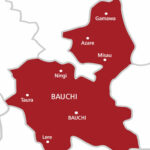The growing trend of misinformation, cyberfraud and phishing has put individuals and organisations at the mercy of criminal elements cloning social media accounts, especially Facebook, to perpetrate crime. This situation is worsened by Facebook’s failure or long delay in taking actions on most occasions, Daily Trust Saturday reports.
A suspected fraudster, Imaobong Akpan, made 10 young women pay ‘in cash and kind’ after he paraded himself as an aide to Pastor Umo Eno, the Commissioner for Land and Water Resources in Akwa Ibom State.
Akpan, who was paraded by the state police command in January 2022, didn’t defraud his victims at gunpoint or draw a dagger at them. His fraudulent tool was just a click on Facebook, an open social networking service.
Some of the exhibits recovered from him by the police include five SIM cards, two phones, dollar and yuan notes.
The police spokesperson in the state, Odiko MacDon, said Akpan defrauded unsuspecting members of the public, mostly women, by offering them fake jobs after having sex with them.
“The suspect, who is a notorious fraudster and sex maniac, confessed to have fraudulently created the Facebook account. He used the said account to lure innocent and unsuspecting young women to hotels, have carnal knowledge of them, with a promise to assist them secure jobs, while defrauding others of various sums of money running into millions.
“He succeeded in luring more than 10 young women through the fraudulent Facebook account and had sexual intercourse with them at various hotels while posing as the personal assistant to the honourable commissioner,” MacDon disclosed.
The suspect reportedly confessed to the crime, saying he did not know what pushed him into the act.
Facebook is the most used online social network worldwide. As at the first quarter of 2022, it has roughly 2.93 billion monthly active users globally, according to Statista.
In Nigeria, 36.24 million users currently access Facebook, and the number is projected to hit 69.4million by 2026.
With rapid growth in the number of users, the fraudulent activities on Facebook are bound to get worse if proper measures are not put in place.
Scams perpetrated via Facebook run into millions of dollars, with the perpetrators going scot-free in most cases. Scammers often manipulate accounts of celebrities, senior government officials, security chiefs and high-ranking officers, popular brands, government agencies, among others, to defraud unsuspecting members of the public.
In December 2019, the Economic and Financial Crimes Commission (EFCC), Lagos zonal office, arraigned one Malik Wakili before Justice Chukwujekwu Aneke of the Federal High Court in Ikoyi, Lagos, on a three-count charge bordering on impersonation, conspiracy and money laundering to the tune of N3.1million.
The defendant and his accomplice at large allegedly impersonated a former governor of Lagos State and Minister of Works and Housing, Babatunde Fashola.
While the data on social media scams in Nigeria is scanty, reports by the Consumer Sentinel Network of the United States’ Federal Trade Commission indicate that social media websites and apps have become popular hangouts for scammers, with losses to such frauds estimated at $134m in 2019 alone and reached record high of $117m in the first half of 2020.
“At that time, the reported scams that started on the social media often related to online shopping, romance scams, and supposed economic relief or income opportunities.
“These reports skyrocketed with the pandemic, and nearly one in four reports to the FTC mentioned a social media hook. People mentioned Facebook or Instagram in 94 per cent of reports that identified a specific platform,” FTC stated on its website.
In a December 10, 2020 investigative report by an American news website, BuzzFeed News, it was reported that “Facebook created a financial symbiosis with scammers, hackers and disinformation peddlers who use its platforms to rip off and manipulate people around the world,” adding that this resulted in a global economy of dishonesty in which Facebook “prioritised revenue over the enforcement of policies seemingly put in place to protect the people who use its platform.”
Facebook lapses
People and organisations whose accounts are impersonated have lamented slow response from Facebook or inaction in some cases after reporting the parody accounts. Experts have also raised concern over the failure of the social media giant to be proactive and nip scams in the bud.
“The management team should be more alert and up their game by responding swiftly to users’ complaints and reports,” an information technology expert, Damilola Akinsola, said.
“To better safeguard people’s information, they should grow the size of their security team and focus on building stronger protections,” he added.
Damilola warned that Facebook’s failure to act on these issues had dire consequences, with many bound to lose “trust and confidence in the app and its managers, which will lead to the social media giant losing several users who depend on their app for different reasons and purposes.”
Another expert, Samuel George, urged Facebook to find “an effective way of tracking those fake account users, block and deactivate their accounts and institute lawsuits against them.”
An avenue for hate speech
In a statement in May, the Federal Government asked Facebook and other social media platforms to stop allowing the Indigenous People of Biafra (IPOB) from using their platforms to incite violence and instigate ethnic crisis in Nigeria.
The Minister of Information and Culture, Lai Mohammed, said since IPOB had been proscribed and classified as a terrorist organisation, “Facebook has no justification for yielding its platform to the organisation to further its campaign of hate and destabilisation of the country.”
The minister was quoted by his special assistant on media, Segun Adeyemi, to have made the demand in Abuja at a meeting with a team from Facebook.
He said, “I have called this meeting to enable us discuss the increasing use of Facebook by separatists and anarchists, especially those of them based outside the country, to instigate violence and ethnic hatred in Nigeria.
“For whatever reason, they seem to have now chosen Facebook as their platform. And their tools include disinformation, incendiary statements and hate speech. They use Facebook broadcasts to reach their followers, who are in thousands. They tag those opposed to their violent ways as ‘saboteurs’ who must be attacked, maimed and killed. They use both English and their local language as it suits them.”
Mohammed noted that the actions of the proscribed group as purveyors of hate and violence had resulted in killings and attacks on private and public property, security agencies and other symbols of government.
He said that despite the numerous complaints to Facebook on the activities of the IPOB, nothing had been done by the company to curtail the group’s excesses on the social media platform.
“Our social media people have been monitoring these separatists, anarchists and purveyors of hate, and have been reporting their atrocious actions to Facebook, but all they get are default responses that their complaints have been received and are being looked into.
“Most often than not, nothing is done about such complaints. The truth is that whatever Facebook is doing to check these people is mere tokenism and is totally ineffective,” the minister added.
No provision for emailing fake account complaints
Checks by our correspondent showed that impostors cannot be reported to Facebook through emails, though complaints bordering on intellectual property rights can be emailed to the company.
“For help with matters other than infringement/violation of your legal rights, the links below may be helpful,” The Facebook team wrote in response to an enquiry sent to the company over why it doesn’t flag parody accounts before the real owners complain and why it is slow to act.

 Join Daily Trust WhatsApp Community For Quick Access To News and Happenings Around You.
Join Daily Trust WhatsApp Community For Quick Access To News and Happenings Around You.


